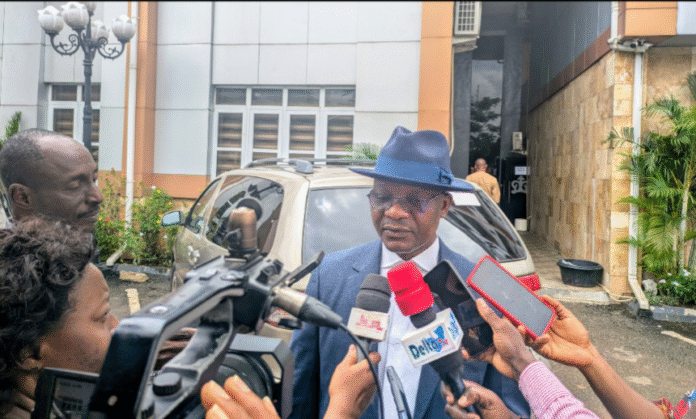Delta State Commissioner for Works (Rural Roads) and Public Information, Mr Charles Aniagwu, has said that social protection is not only about welfare but also about protecting the humanity of vulnerable citizens and reducing crime in society.
Aniagwu made the statement on Wednesday, September 18, 2025, at a state-level dialogue on social protection held in Asaba. The event was organised by the Africa Network for Environment and Economic Justice (ANEEJ) through its Act Naija project, in partnership with the Delta State Ministry of Economic Planning and with support from the European Union.
He noted that the administration of Governor Sheriff Oborevwori has rolled out several programmes to support vulnerable groups, including the Delta Community Action for Resilience and Stimulus (D-CARES), MORE BizUp, the Widows Welfare Scheme, and the enrolment of vulnerable persons in the state’s Contributory Healthcare Insurance Scheme, which the government fully funded.
“It is a good thing that both the government and civil society are recognising the excruciating times the vulnerable are passing through. These programmes are helping them live without losing their humanity,” Aniagwu said.
He explained that discussions with stakeholders were important to address challenges such as ineffective targeting, cultural barriers, and political interference that often hinder the success of welfare programmes. According to him, Delta State has already made progress in overcoming these obstacles.
Aniagwu also linked social protection to reducing crime, stressing that when citizens live meaningfully, they are less likely to engage in criminal activities. “The cost of preventing crime through social protection is far less than the funds needed to cure the negative consequences of crime,” he said.
The commissioner commended Rev. David Ugolor, Executive Director of ANEEJ, describing him as a committed activist with a long history of fighting for the rights of ordinary Nigerians. “I do not have any doubt that the outcome of this dialogue will yield positive results and take us closer to where we want to be,” Aniagwu added.
Earlier in his remarks, Ugolor urged the state government to give legal backing to its social protection programmes by signing into law the Delta State Social Protection Bill, passed by the House of Assembly in 2023.
A baseline survey conducted by ANEEJ shows that 36.3% of Deltans—about 1.5 million people—live in multidimensional poverty, although the figure is lower than the national average of 63%. The report highlighted regional disparities: Delta North faces more deprivation due to rural challenges, Delta Central struggles with youth unemployment, while Delta South suffers underdevelopment in its coastal communities.
Stakeholders at the meeting resolved to work toward a unified, transparent, and inclusive framework for social protection that will improve welfare and build resilience for all citizens in the state.



